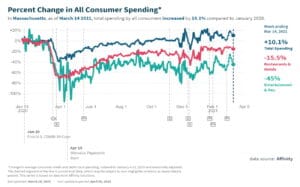
Total consumer spending in Massachusetts in March was about 10 percent higher than in January 2020, but it remained 15 percent below that level for restaurants and hotels and 45 percent down for entertainment and recreation, according to data that Undersecretary of Business Growth Mark Fuller presented at a Friday committee hearing. Courtesy graphic
The tourism and hospitality sector has been decimated by the COVID-19 pandemic, facing sharp declines in business that will be slow to recover without additional state action, industry leaders told lawmakers on Friday.
A parade of speakers outlined a dire economic picture at a Tourism, Arts and Cultural Development Committee hearing aimed at learning about the pandemic’s impact. The widespread job losses and drop in spending, they warned, could take years to rebound, impacting workers across the state as well as tax revenues.
Industry groups representing restaurants, hotels and motels, cultural organizations, event venues, and tourism promotion urged the panel to boost spending on recovery grants, advertisement programs aimed at encouraging travel to Massachusetts, and support for regional tourism councils.
“We’re not going to be able to wish, pray and hope our way out of this pandemic,” said Martha Sheridan, president of the Greater Boston Convention and Visitors Bureau. “It’s just not going to happen. The only way we’re going to get out of it is if we remain competitive and invest strategically in tourism promotion.”
The Baker administration has distributed more than $650 million in relief grants to about 14,400 businesses so far, and cultural nonprofits received almost $10 million through a separate grant program in January.
The federal government also launched a new $16 billion grant program on Thursday for shuttered venues, aiming to assist live venue operators, theatrical producers, live performing arts organization operators, museum operators, movie theater operators, and talent representatives affected by mandatory closures.
Industry leaders want the Legislature to supplement those programs. A top priority several cited is a bill (SD 2105) that would direct at least $200 million from the billions in federal stimulus funding Massachusetts received to help cultural organizations recover.
The funding would be distributed by the Massachusetts Cultural Council in the form of grants to both nonprofit and for-profit cultural organizations that could be used for payroll, rent and other expenses, adapting programming to cope with COVID, and investing in technology and infrastructure for safe reopening.
Through Friday, 51 lawmakers had cosponsored the bill, which was authored by Tourism, Arts and Cultural Development Committee Co-chair Sen. Edward Kennedy of Lowell.
Another major change many said they want to see is a clearer timeline for business restrictions. Knowing when allowable gathering limits will increase would encourage many tipped workers in the industry to return to the workforce, speakers said, and would give event venues enough lead time to ramp up operations.
“If those employees don’t see that gathering numbers are going up and in fact the number of people they’ll be serving is increasing, which will have a direct corresponding increase on their wages, the desire to return to work for them might be less,” Sheridan said.
They also called on the Baker administration to release $4 million for regional tourism councils included in an economic development bill Gov. Charlie Baker signed in January. Those councils, Massachusetts Lodging Association President Paul Sacco said, play an important role in converting pent-up consumer demand into spending in Massachusetts.
“Unless we do something as you heard from the RTCs, we’re going to have a missed opportunity June through September to capture some of this business,” he said.
While the industry has been hit hard across the country, the damage is particularly pronounced in Massachusetts. Leisure and hospitality, as defined by the Bureau of Labor Statistics, lost 30 percent of its jobs from February 2020 to February 2021, a far greater share than any of the nine other categories.
North of Boston Convention and Visitors Bureau Executive Director Ann Marie Casie said projections indicate domestic travel will rebound more quickly than international travel, reaching 2019 levels by the end of 2022.
“We will not see a full recovery of the tourism industry in its entirety until after 2024,” she said.
More than half of the 40,000 hotel jobs in the Bay State pre-COVID have been either furloughed or eliminated, while statewide lodging market occupancy rate dropped by nearly half from 2019 to 2020, Sacco told the committee.
The restaurant industry lost $7 billion in sales over the course of a year, according to Massachusetts Restaurant Association President Bob Luz. After the initial closures in March 2020 when the state of emergency began, 3,400 Massachusetts restaurants — about 23 percent those in the state — never reopened again.
Luz said legislative authorization for selling alcohol to-go has been a boon during the pandemic. Before the COVID era, to-go sales and delivery typically represented 8 to 10 percent of revenue for most sit-down restaurants, but the share reached as high as 50 or 60 percent in the winter, Luz said.
Nonprofit cultural organizations that responded to a Mass Cultural Council impact survey have collectively lost $588 million in revenue since March 2020, and more than 2,900 artists and creative workers who also responded reported $30 million in lost personal income.
State-tracked data show that the sectors continue to lag other industries even as vaccinations drive increasing business optimism.
After dropping sharply early in the pandemic, overall consumer spending has rebounded and in mid-March exceeded January 2020 levels by about 10 percent, according to figures that Undersecretary of Business Growth Mark Fuller presented at Friday’s hearing. Spending on restaurants and hotels, however, still lagged more than 15 percent below January 2020, while entertainment and recreation spending remains down about 45 percent.
Fuller said the disparities reflect “hugely painful dislocation while overall spending has started to return to more normal levels.”
Massachusetts entered the fourth phase of the Baker administration’s economic reopening plan on March 22, allowing entertainment venues to reopen and pushing up the gathering limits for public settings to 100 people indoors and 150 people outdoors.
Fuller told lawmakers that it remains unclear how consumer behavior, critical to the business outlook for the affected industries, will respond as restrictions ease.
“This is a huge dynamic impacted by the spread of COVID, impacted by the restrictions and phased reopening, impacted by how people perceive the safety of those activities,” Fuller said. “Are they excited to go out and spend? Are they excited to travel? Do they feel comfortable doing that? So much of the recovery here as we look toward the future is about that consumer behavior and making people feel comfortable returning to some level of normal activity with COVID in mind.”
Several industry leaders cautioned that the damage carries significant implications for the state as a whole.
Travel spending has dropped 53 percent in Massachusetts — a sharper decrease than the 38 percent for the U.S. as a whole — “translating to more than $15 billion in spending losses, $451 million in loss of state taxes, and $234 million tax losses to our cities and towns,” Casey said.
The losses likely have a cascading effect, too. With fewer events or cultural activities ongoing, for example, restaurants and retail businesses have fewer potential customers moving around. In a 2019 report, Arts Boston concluded that arts and cultural events drew more than four times as many attendees as all major Boston sporting events combined.
“We know that arts and culture and tourism and humanities generate a lot of revenue,” Massachusetts Cultural Council Executive Director Michael Bobbitt told lawmakers. “If we want to bounce back, we need to double down and support these organizations even more.”





